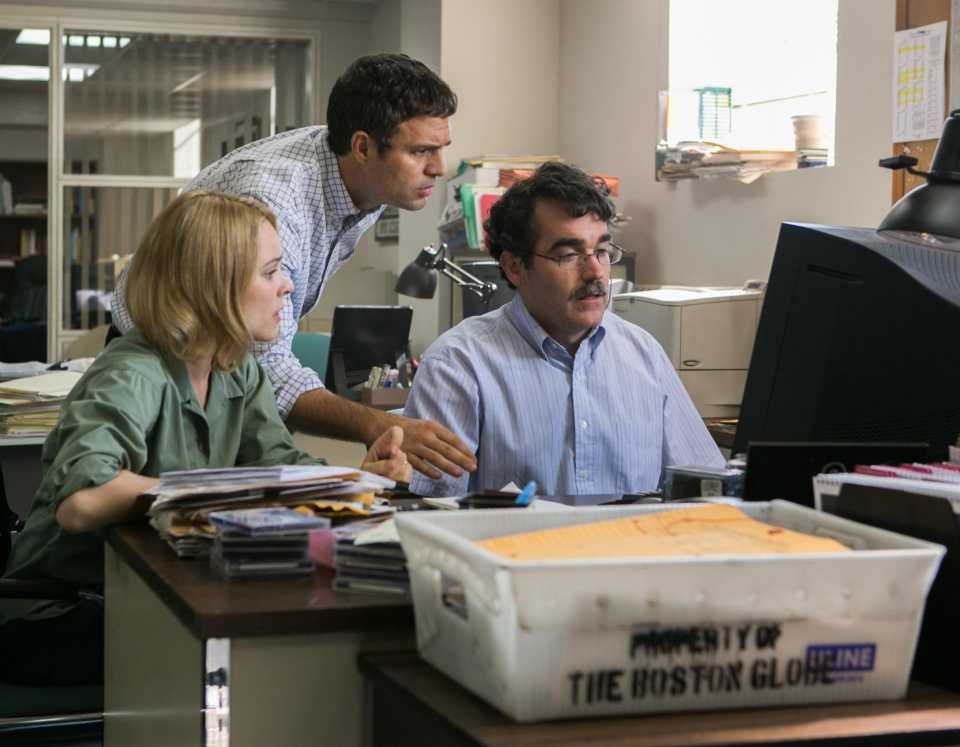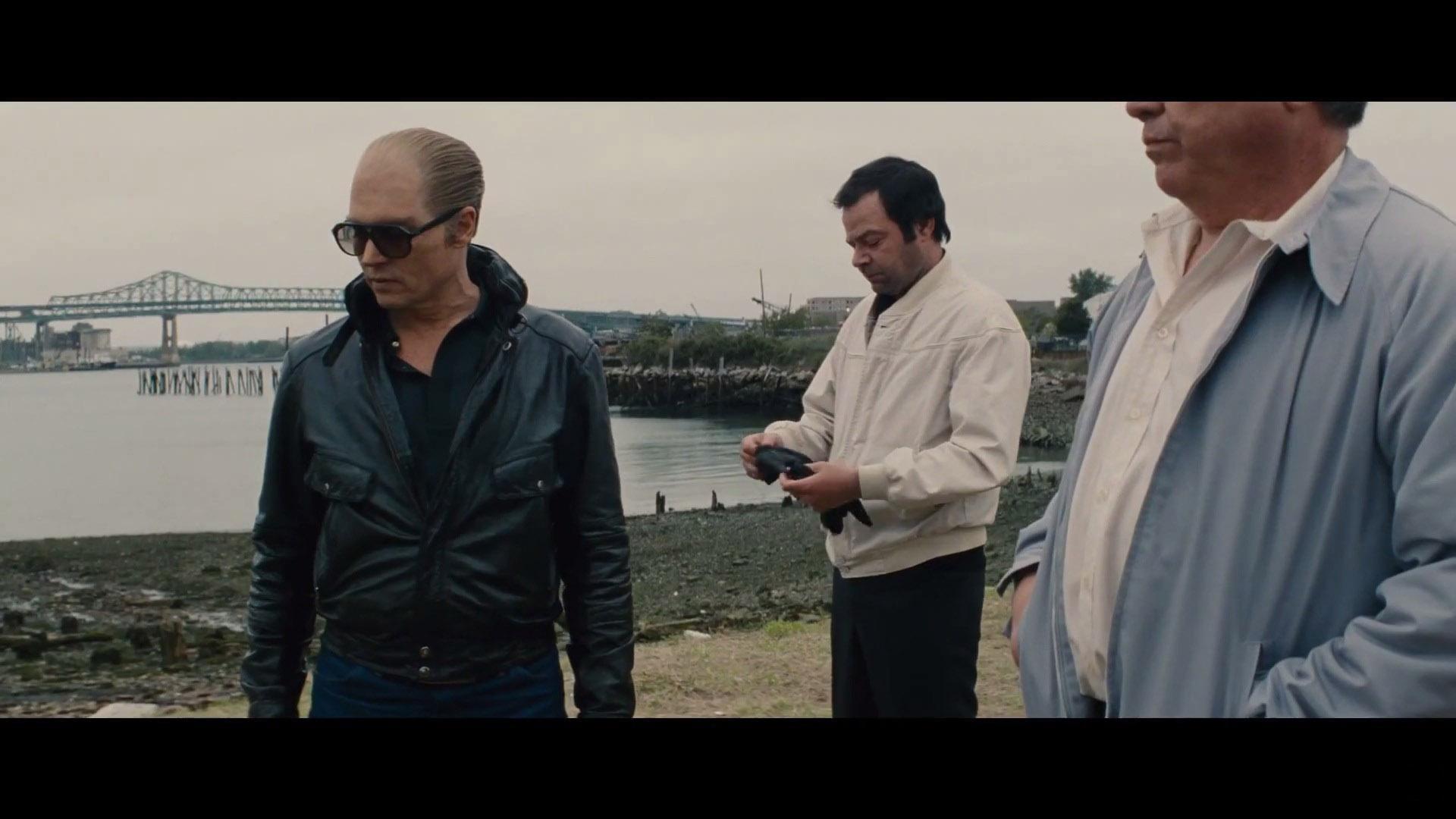|
Imagine Boston on film, without the bad guys and bad accents
By Ty Burr
[with video] Somewhere along the line, Boston has become Hollywood shorthand for colorful thuggishness. We’ve been living with that, for better and for worse, for a few decades now. But the tide may be changing. The newspaper drama “Spotlight” has racked up a number of year-end critics’ awards — including, as of this week, the Los Angeles Film Critics Association, the Golden Globe nominations, and (surprise, surprise) the Boston Society of Film Critics. It continues to be considered a best picture Oscar front-runner by those who prognosticate. In one important aspect, though, Tom McCarthy’s film has already achieved a solid win. It has taken the Boston movie away from the bad boys and given it back to the rest of us. Here’s the thing. Two interlocked aspects make our corner of the world different from other American cities: institutionalism and clannishness. The former is responsible for Boston’s national leadership in academia, medicine, technology, the arts, and other arenas. The latter is baked into the fabric of the place, from the WASPs who founded Boston to the Irish and Italian immigrants who arrived in the 19th century and formed the spine of the area’s middle class, to the African-Americans who, as in most US cities, were historically and geographically roped off from power for decades. Boston has come of age as a movie location in the 18 years since “Good Will Hunting” kicked off the modern era, which is to say our city holds purchase in the national psyche in ways it never quite used to. This year, between “Spotlight” and the Whitey Bulger saga “Black Mass,” something like cinematic critical mass seems to be upon us for the first time since 1968, when “The Thomas Crown Affair,” “Charly,” and “The Boston Strangler” crowded national marquees. So it’s worth asking which face — or faces — are being presented to the world, and whether the likenesses are just. The best Boston movies have worked in those twin shadows of institutional idealism and loyalty to clan, of the powers on the hill and the secrets kept below. In this season’s two films, the shadows overlap. Both “Black Mass” and “Spotlight” illustrate the push-pull of tribal fealty and civic responsibility — of doing what’s always been done versus doing what’s right. They just come at it from different directions, one up from the streets of Southie into a crooked FBI office, the other down from a city newsroom into the corrupt secrets of a Roman Catholic archdiocese (and, it’s implied, the national and global church). No one in either movie comes off wholly untainted, except maybe for the outsiders who start the ball rolling — the editor-in-chief played by Liev Schreiber in “Spotlight,” the assistant US attorney played by Corey Stoll in “Black Mass.” That in itself tells you something about the power of tight-knit groups hiding behind systemic castle walls. The Globe and other media had earlier chances to investigate clergy sexual abuse but didn’t go deep enough; the FBI office in “Black Mass” is full of agents pursuing their own agendas. Transparency is anathema to the way we’ve done business in these parts for so very long. A recent Globe article pointed out that the Massachusetts Legislature, the judiciary, and the governor’s office are exempt from the Open Records law — the only state in the country in which all three branches of the government keep their documents from public sight. It’s the backroom handshake that seals the deal — the nod of complicity, the silent agreement to look away. Exposing this makes for good movies, and maybe we should have more of them. Instead, the rest of America knows us onscreen by our most popular export, the Bahstan Gangster Flick. Taking its cue from the continuum of great Hub novelists that started with George V. Higgins and runs through Dennis Lehane, the Boston crime movie was launched with 1973’s classic “The Friends of Eddie Coyle” — and there the matter lay for several decades. Lehane’s arrival in the 1990s set the groundwork for the second wave: “Mystic River” (2003) and “Gone Baby Gone” (2007), as well as Martin Scorsese’s “The Departed” (2006) and 2010’s “The Town,” neither of which were based on Lehane but still feel like part of the gang. (Then there’s 2010’s “The Fighter,” set out among the boxing brothers in Lowell and a glorious wallow in low-rent localism.) The elements are so familiar by now as to seem trite: nonrhotic accents mangled to one degree or another by earnest out-of-town actors, overcast camera shots down G Street in Southie and other landmarks of ethnic authenticity, eruptions of violence that owe as much to Scorsese’s “Mean Streets” and “Goodfellas” as to documented local history. So popular have these movies been — precisely because they deal in stereotypes — that they have wiped other kinds of Boston movies off the cultural map (except for, perhaps, the bonehead-comedy-on-the-Charles genre exemplified by the recent “Ted” and “The Heat,” both of them funnier than proper-thinking minds would prefer them to be). We used to have other kinds of Boston films. There were movies that took place in the halls of academia — “Love Story” (1970), “The Paper Chase” (1978), even “Legally Blonde” (set at Harvard but shot at USC). “Next Stop Wonderland,” Brad Anderson’s delicate 1998 local romantic drama, got fine reviews but was overshadowed at the time by Denis Leary’s “Monument Avenue” (“Mean Streets” in Charlestown) and the infamous “The Boondock Saints” (Tarantino in Southie). “Fever Pitch” (2005) was the best of the Boston sports movies, a tiny genre including “Celtic Pride” (1996), which may in fact be the worst Boston movie of all time. We even used to have different kinds of Boston crime films. “The Brinks Job” (1978) was a comedy of North End nostalgia. The original “Thomas Crown Affair” was an upscale caper film the Chamber of Commerce could love; the 1999 remake, by contrast, decamped to Manhattan. It all changed with the deserved rise of Lehane and the hardening of Boston’s central cinematic arteries. “Black Mass” has had the chronological misfortune of coming last in the parade of Boston Gangster movies, and the irony of its timing is that the movie is based on actual events and still feels secondhand. Good performances all around, quality filmmaking, and a decent nose for locations can’t shake the familiarity that comes from a story being covered for decades in the press and a psychic landscape that the movies have long since colonized. Maybe Jack Nicholson’s ersatz Whitey in “The Departed” is less truthful than Depp’s “real” one in “Black Mass.” But Nicholson’s was just as scary, and he got there first. “Spotlight” is something different, though — a drama that changes the focus, if not the accent, of Boston cinema. By bearing down upon both a church hierarchy that buried the truth for decades and the establishment newspaper that (the movie argues) might have acted sooner, the film derives its drama not from the city’s “colorful” fringe elements but from the sins of those in charge. It is, arguably, an expansion of Sidney Lumet’s 1982 classic “The Verdict,” the first movie to call our local institutional powers to account. That film — the best actor Oscar Paul Newman should have won — fictionalized the 1966 Edabeth Katz malpractice case and the medical coverup it revealed, and it dramatized how the connections of those in high places can form a wall to hide unpleasantness from sight and dissuade anyone interested in seeking the truth. We’re an infinitely less Balkanized, more cosmopolitan city than when “The Verdict” came out. But Boston’s still a place where many people stick to those who look like them and where institutions can serve as powerful forces for inertia and repression rather than illumination and connection. “Spotlight” reminds us that those institutions are made up of individuals — journalists or clergy; doctors, lawyers, political chiefs — and that it’s the individuals who decide the morality of an institution, not the other way around. Yes, we should be getting more Boston-centric romances and comedies and mysteries — heck, why not a musical? (You can call it “A Stah is Born”). But another “Spotlight” or two, a drama of finding the larger civic good among groups raised to distrust each other, might tell a story we alone might recognize. Contact: tburr@globe.com
|
.
Any original material on these pages is copyright © BishopAccountability.org 2004. Reproduce freely with attribution.

